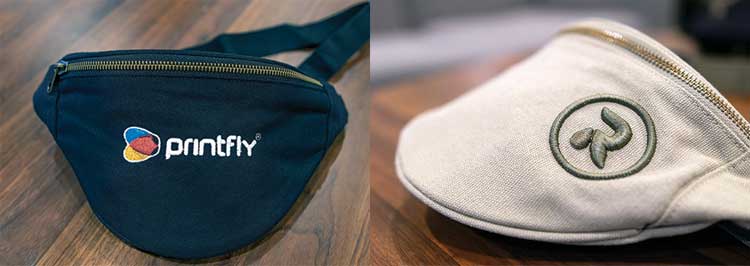August 15, 2019
How To Design On Fanny Packs
Fanny packs are cool again. But what’s the best way to decorate this once-maligned item?
In the last few years, the fashion world has declared that the iconic ’80s- and ’90s-era accessory, the fanny pack, is back. But the truth is it never went away. Fanny packs remained popular among skaters and festival-goers, even as they were roundly mocked in popular culture.
Fanny packs are once again on an upswing, however, with luxury fashion brands like Gucci offering their own versions of the “belt bag” and big-name celebrities like Kendall Jenner and Sarah Jessica Parker sporting the style in public. Last year, fanny packs made up 25% of the accessory industry’s growth, according to Quartzy. Some of this is due to ’90s nostalgia, but it’s also about convenience: People have more stuff than ever to carry around. Fanny packs range in price, with synthetic fabric options being the cheapest and luxury leather models on the high end. A 100% cotton canvas belt bag is a great affordable option for promotional purposes.

These Comfort Colors (asi/56842) canvas fanny packs (344) feature a standard, centered embroidered logo (left) and an off-center ultra-puff embroidery (right). Make sure fanny packs have sturdy materials and enough room to decorate.
The first thing to consider when decorating fanny packs is print area. For embroidery, it should be large enough to secure and stay flat in the hoop. While some manufacturers offer very small hoops, the majority of shops won’t have them lying around and would need to place a special order, delaying the job. Speaking of the hoop, your fanny pack of choice shouldn’t have any extraneous parts that would get in the way of the hoop being secured, such as zippers, pockets, buckles, buttons or straps.
Another thing to consider is that the opening will need to be big enough for the bobbin arm to be inserted. A bobbin arm is the part of the embroidery machine that has an arm or cylinder that the hook and bobbin are mounted in. It allows the use of special frames for embroidering caps, socks, inside pockets – or fanny packs. The cylinder-shaped arm allows the goods to be curved around it for the embroidery magic to happen.
For screen printing or vinyl, you run into a similar issue: The bag must be secured on a special platen, with a large enough print area without any obstructions – including seams, textures or odd angles in the structure. Anything that gets in the way of the print area could make the job difficult if not impossible.
Be careful about the materials. Avoid anything overly plastic, especially polypropylene. This material will start melting at 300 degrees, so putting it under a strong heat press or sending it through a normal dryer is out of the question. (I’m not sure why they make anything out of this stuff.) Other blended synthetic fabrics can be problematic too. A heat press can permanently change the shape of the bag, or the surface texture can become shiny in the part that was pressed.
Bottom line: Since there are so many styles of fanny packs, be particularly careful in selecting one made with appropriate material that will allow for customization – and doesn’t make you want to tear your hair out when you do it.
When I checked in with our fabulous embroidery manager, Letitia Lewis, to ask about customizing fanny packs, I brought two different bags, but unfortunately, neither would work because of their small print areas. She said if she really tried she could get it to work, but it would be a big pain in the fanny with no guarantee of success, and a nightmare to do a large run. So back they went. This is a good lesson: Order samples before making a big purchase.
When deciding on this product and choosing the style, know your audience: If your client is promoting to the younger, festival-going set, the fashion-conscious or the active/outdoor set, chances are they’ll be into fanny packs, but each group might prefer different styles. Also, consider how they’ll be used. Some trades or occupations might be especially suited to need these for work. And if the promotion you’re working on includes other swag, a fanny pack is a great place to stow it.
Imri Merritt works in art, design and marketing for Rush Order Tees, a division of Printfly Corp.